Writers@Work: Creating Books from Family Stories
November 24, 2020
Note From Rochelle
Dear Writers,
Happy Thanksgiving week! I am looking forward to spending the weekend cooking and reading. I’m also planning what I want to read for Christmas break. If you’re a published author and have a book you’d like to share on the Write Now! Coach blog, check out my call for writers: https://writenowcoach.com/writersread-call-for-guest-posts/
This month, I’ve had a series of posts on writing memoir. Sue William Silverman wrote a post about how writing your memoir can improve your life, “Write Your Memoir, Change Your Life.” I shared my tips for making your memoir better.
Today, I’m delighted to welcome Abbey Algiers to the blog to talk about how she is collecting letters from her dad into a book, Letters to Louie. If you’d like to interview family members or friends about their lives, read on for tips on how to do it!
Enjoy!
Rochelle
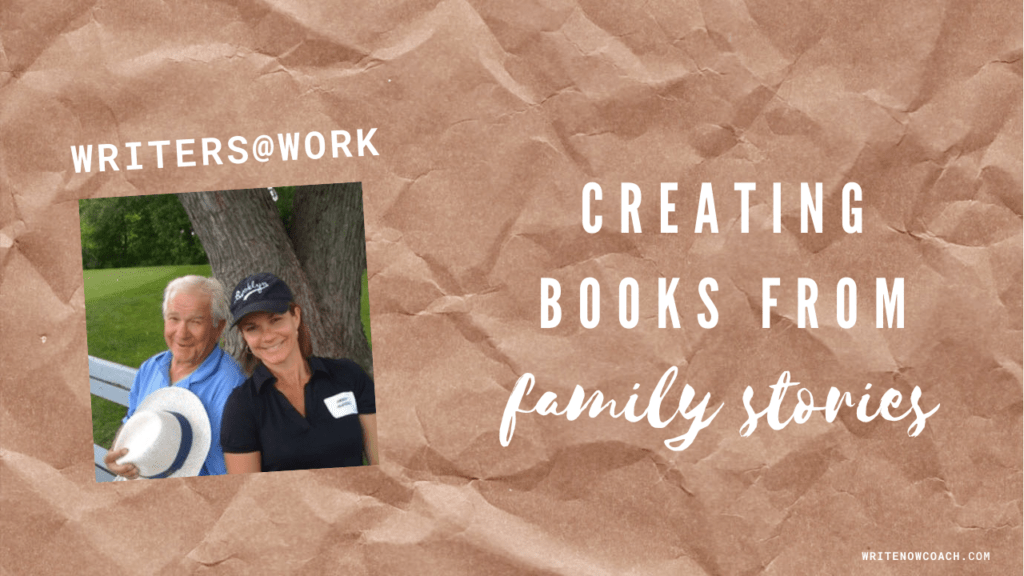
Writers@Work: Creating Books from Family Stories
An interview with
writer Abbey Algiers
You’re working on a book entitled Letters to Louie, which is a compilation of letters your father wrote to a childhood friend. Can you tell us about this project?
My dad grew up in a small town. After WWII and medical school, he returned to that small town to raise his family and practice medicine. In his retirement, he started writing “letters” (emails) to his childhood friend Louie, recounting memories of the past but also using stories to comment on current events and life in general.
My dad started writing these letters in 2011. He’d write to Louie and then cc my sisters and me. We loved the letters, and kept asking him to continue sending them. He really got on a roll and wrote a lot of letters. Sometimes he’d mix in letters to other people—his friends, grandsons, a nephew, but they always came back to focusing on Louie.
What did he write to Louie? What are the themes of the letters?
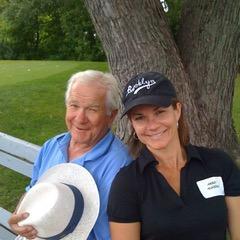
Dr. James Algiers and Abbey Algiers
He wrote about everything—childhood memories, raising his own family, life as a doctor in a small town. He recounted cases of house calls. He talked about people he knew as a child and wove the stories of their lives (where they came from) into the fabric and tales of their lives as adults. He also wrote about his family—his mother’s tuberculosis and her time away from the family, his brother’s polio, and stories about his hard working father. All of these events were in the past, but are very relevant to the things we’re going through now. The way he told the stories spoke more to human nature and response to crises and life events than the historical context and response at the time. And, in his own unique style, my dad would weave a lesson in basic human decency into each of the letters.
All the while, my sister and I would ask, “Is Louie real?” The thing is, my sisters and I had never really heard of or met Louie before the letters. Our dad assured us that Louie was real and explained his childhood ties to Louie. Then one day, we got a call to say that Louie had died. We were so sad, even though we had never met Louie. It was like a glimpse of something we’d have to experience one day with our own family. This was hard news to take for my dad, but also brought up the theme of some of his letters—mortality for everyone—but especially of those in my dad’s age group.
The letters continued though, even after Louie died. He’d write to “Louie in the Great Beyond.” They picked up more momentum and were a way for my dad to tell his own history and the history of the city where he grew up—Hartford. He told stories of the characters in his life which really could be substituted for characters in the life of the reader. The themes of his letters are pretty universal.
As my dad wrote the letters, my writing career took off as well. I’d send him my latest articles and he’d send his letters. Writing was a bond we shared. I always told him he had a bestseller in the making with his letters. He’d reply by telling me that after he was gone, I should “go for it.” I kept encouraging him to write in the meantime. He did write, and also began to talk about his letters in interviews both on the radio and local television station where he lived.
You are now putting those letters together in a book. How many letters do you have and how are you going about this?
I’m in the process of organizing the letters—I’ve got three large binders of the letters he printed off, and I’ve also got his computer with more letters. Now it’s a matter of organizing the letters into categories and determining how they’ll fit in the book. I’m posting the letters on his website, letterstolouie.com. My goal is to complete a draft of the book by May 28, 2021—as this will mark the one year anniversary of my dad’s passing.
Unfortunately, your dad did pass away this past spring. But before he did, you were able to interview him about his perspective on COVID – as a 94 year old retired physician who had lived through so many historical moments. Can you talk about that?
During the pandemic, my dad and mom were in senior living facility, so we were not able to see them. In addition, my dad was in end stages of prostate cancer. However, no matter how sick he got, he still was 100 percent sharp and relevant—especially in areas of medicine and the world. I knew his perspective of the pandemic was something I wanted to talk to him about as he’d always had a strong opinion of the danger of viruses. Since his residency during the 1950s, he’d been saying, “Viruses will be the threat of the future.”
I interviewed him over the phone and asked him how COVID – 19 compared to other pandemics of the past and other historical events. I asked him his thoughts on the virus and how it would affect our future. Finally, I asked him how the situation affected the elderly in general—being cut off from their loved ones. His answers were profound, heartfelt, and so extremely accurate as many of the things he hinted might happen have actually happened since we spoke early in the pandemic.
I posted his interview on social media and it went completely viral, going to over 31 countries. Every day I’d call him with a report on how many people had viewed his article and where it had been read. He was so extremely proud.
One of his main points in the article was that we had to take COVID seriously—that it was a serious threat and that it wasn’t going to go away anytime soon. He spoke to our need to pay attention to this fact and be sensible. He also stressed how now more than ever, it was important for us to be there for each other and help each other.
Sadly and ironically, my dad already being at risk due to his age and his cancer, contracted COVID and then quickly passed away in May.
Can you offer suggestions for people who might want to interview elderly family members or friends?
I would encourage those with elderly family members—whether you’re able to visit them or have to rely on phone calls, FaceTime, etc.—to take the time to ask questions about your family members’ pasts. Even though I had this wonderful interview with my dad, there are so many other questions I wish I would have asked, so many conversations I wish I’d have had. I’d had people tell me to get the stories recorded for years, and I always thought I’d do it someday. Make someday sometime soon! Your questions don’t have to be anything fancy or follow a theme—you could just start by having regular phone conversations and perhaps recording them. StoryCorps and Vita Memoirs are two examples of ways to record these conversations, but you could also use your smart phone. Take notes when your relative says things. Everything they share with you will be treasured someday.
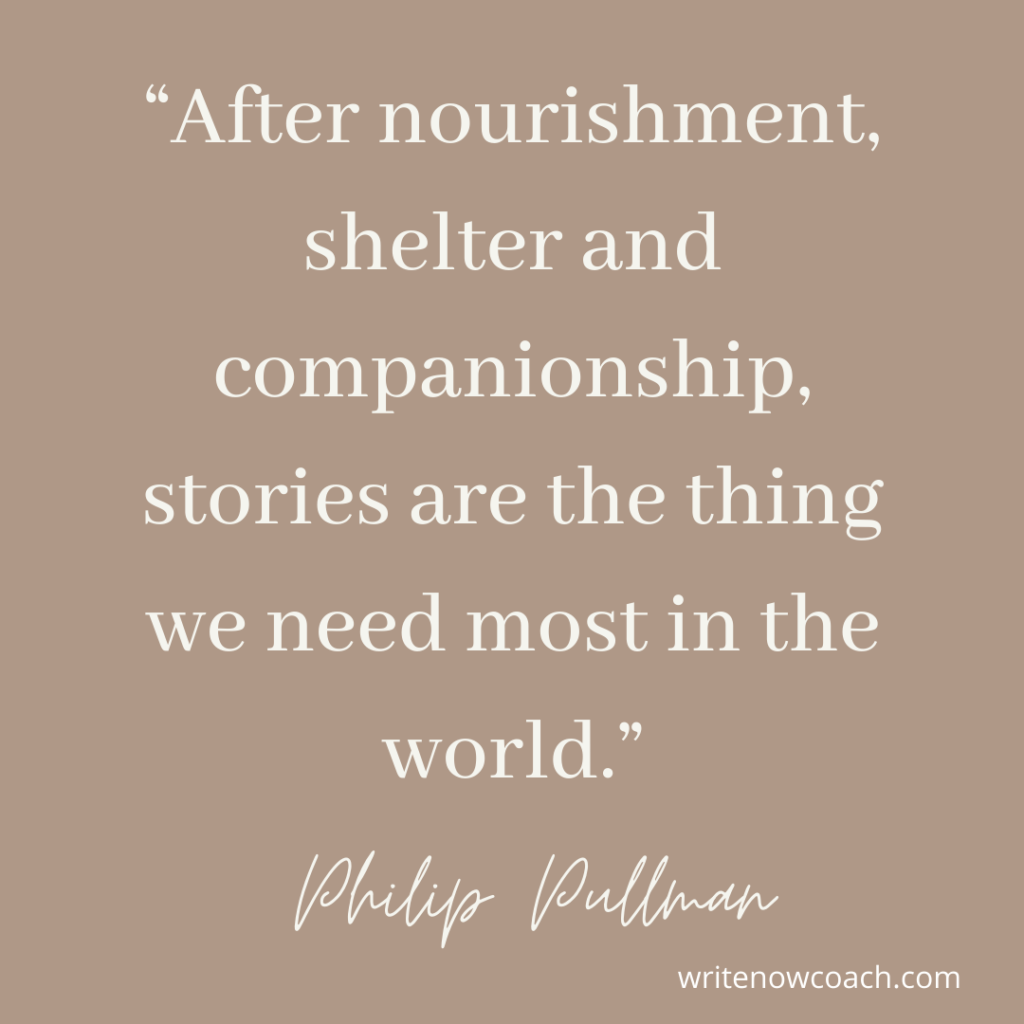
If a long interview seems too big, then how else might people connect meaningfully over the holidays?
There are many ways to connect that don’t have to involve an interview. If you get together in person, make this year the year you finally put all of those photos in an album, and spend some time going through old pictures. If you have to meet virtually, maybe see if you can share the pictures digitally. You can do this with an iPad or other device. There’s also an easier device for seniors called a “GrandPad”—basically a simpler iPad. It lets iPhones and Android users alike have video calls with the GrandPad.
As we approach the holiday season, COVID is again affecting our lives and our ability to see our families. Can you talk about ways to connect even if you can’t be there in person? What have you learned throughout this experience?
This holiday season will look different for all of us—we need to be creative in making the holidays special and spending time together, even it is has to be virtual. Perhaps schedule a time for a Zoom or FaceTime call with relatives and eat a holiday meal together. Send a meal to your elderly parents so they don’t have to cook. Maybe you can go outside your parents’ window and entertain them with a makeshift turkey bowl game. Schedule a time to decorate for the holidays together and do so over FaceTime. Call your mom while you bake cookies and ask her advice. There are so many opportunities to reach out and be together as we do the “normal” things, even when everything has changed. Be creative!
What are you reading?
I’m reading Jenna Bush Hager’s Everything Beautiful in its Time: Seasons of Love and Loss—it’s not only helping me through my own grieving process, but also a great tribute to her grandparents and parents. It’s a great example to refer to as I craft Letters to Louie.
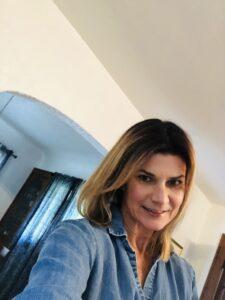 About the author. Abbey Algiers is a freelance writer and ESL instructor who lives with her husband Eric in Milwaukee, Wisconsin. She spends a great deal of time working on a plan that will allow them to divide their time between Wisconsin and Spain. Pre—COVID times, she traveled to Spain each summer to pursue writing gigs, English immersions (see diverbo.com or Suryalila Retreat Centre) and travels with Spaniard friends she’s met along the way.
About the author. Abbey Algiers is a freelance writer and ESL instructor who lives with her husband Eric in Milwaukee, Wisconsin. She spends a great deal of time working on a plan that will allow them to divide their time between Wisconsin and Spain. Pre—COVID times, she traveled to Spain each summer to pursue writing gigs, English immersions (see diverbo.com or Suryalila Retreat Centre) and travels with Spaniard friends she’s met along the way.
Writing has been part of her life since receiving a typewriter for Christmas in first grade. Later, she remembers her dad telling her 8-year-old self, “You know, you’re a really good writer.” (Even though those words came after he’d spent an hour trying to teach 13 minus 6 and other tough math problems…the words still stuck.)
Today, Algiers uses her love of writing in her own writing career (working on freelance projects, inspirational articles, and personal blogs and writing) as well as in her job as an ESL teacher. Lessons from her dad have always inspired her work, and can be seen in her inspirational articles for the LPGA Girls Golf Blog and Women’s Network. It turns out the apple doesn’t fall far from the tree, as her dad left binders full of inspiration in his “Letters to Louie” series, which chronicle his life from childhood to his passing last May. Algiers’ latest project is organizing these letters for a book and blog, letterstolouie.com.

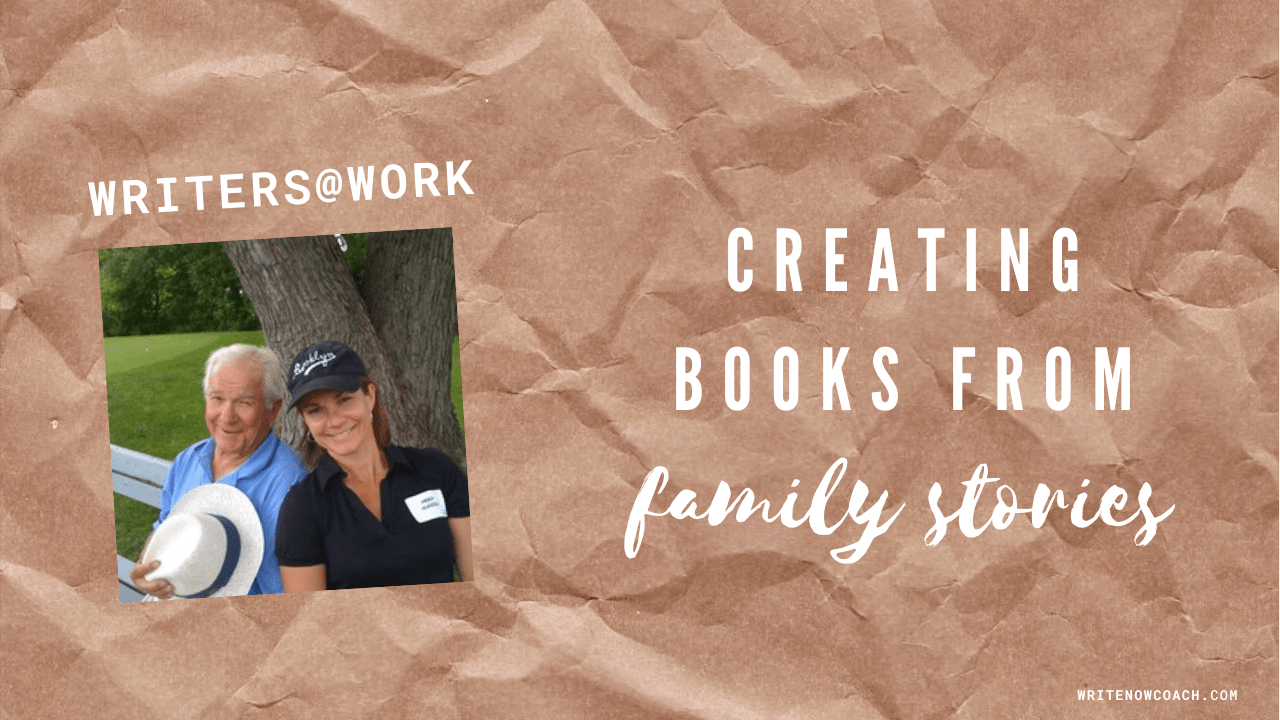








I am so happy to be able to read your words Abbey. I can hear your Dad, too. It means a lot. ♥️
I am so proud of you Abbey and cannot wait to read your book. This is an amazing tribute to your incredible Dad.
I love the suggestions for recording a family history! While it’s important to nail down dates of births, marriages, etc., it’s the stories that can be so meaningful. I’d love to know how my grandparents met and fell in love, for example. I’d also suggest that the older folks go through the family photos and jot IDs and other relevant info on the back. Thanks for the inspiration and good luck with your project, Abbey!